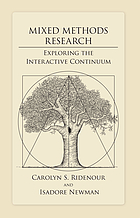Service Alert
Service Alert
Research is a process of inquiry that is carried out in a pondered, organized, and strategic manner. In order to obtain high quality results, it is important to understand methodology.
Research methodology refers to how your project will be designed, what you will observe or measure, and how you will collect and analyze data. The methods you choose must be appropriate for your field and for the specific research questions you are setting out to answer.
A strong understanding of methodology will help you:
Below, you will find resources that mostly cover general aspects of research methodology. In the left column, you will find resources that specifically cover qualitative, quantitative, and mixed methods research.
 Mixed Methods Research
by
Carolyn R. Benz; Isadore Newman
Mixed Methods Research
by
Carolyn R. Benz; Isadore Newman
 Oxford Handbook of Multimethod and Mixed Methods Research Inquiry
by
Sharlene Nagy Hesse-Biber (Editor); R. Burke Johnson (Editor)
Offering a variety of innovative methods and tools, The Oxford Handbook of Multimethod and Mixed Methods Research Inquiry provides the most comprehensive and up-to-date presentation on multi- and mixed-methods research available. Written in clear and concise language by leading scholars in the field, it enhances and disrupts traditional ways of asking and addressing complex research questions. Topics include an overview of theory, paradigms, and scientific inquiry; a guide to conducting a multi- and mixed-methods research study from start to finish; current uses of multi- and mixed-methods research across academic disciplines and research fields; the latest technologies and how they can be incorporated into study design; and a presentation of multiple perspectives on the key remaining debates.Each chapter in the volume is structured to include state-of-the-art research examples that cross a range of disciplines and interdisciplinary research settings. In addition, the Handbook offers multiple quantitative and qualitative theoretical and interdisciplinary visions and praxis. Researchers, faculty, graduate students, and policy makers will appreciate the exceptional, timely, and critical coverage in this Handbook, which deftly addresses the interdisciplinary and complex questions that a diverse set of research communities are facing today.
Oxford Handbook of Multimethod and Mixed Methods Research Inquiry
by
Sharlene Nagy Hesse-Biber (Editor); R. Burke Johnson (Editor)
Offering a variety of innovative methods and tools, The Oxford Handbook of Multimethod and Mixed Methods Research Inquiry provides the most comprehensive and up-to-date presentation on multi- and mixed-methods research available. Written in clear and concise language by leading scholars in the field, it enhances and disrupts traditional ways of asking and addressing complex research questions. Topics include an overview of theory, paradigms, and scientific inquiry; a guide to conducting a multi- and mixed-methods research study from start to finish; current uses of multi- and mixed-methods research across academic disciplines and research fields; the latest technologies and how they can be incorporated into study design; and a presentation of multiple perspectives on the key remaining debates.Each chapter in the volume is structured to include state-of-the-art research examples that cross a range of disciplines and interdisciplinary research settings. In addition, the Handbook offers multiple quantitative and qualitative theoretical and interdisciplinary visions and praxis. Researchers, faculty, graduate students, and policy makers will appreciate the exceptional, timely, and critical coverage in this Handbook, which deftly addresses the interdisciplinary and complex questions that a diverse set of research communities are facing today.
